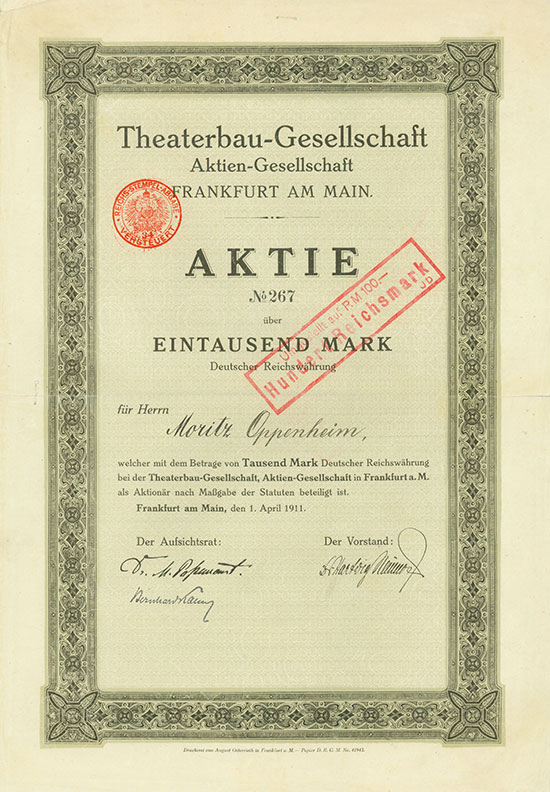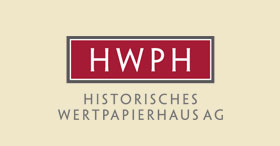Ingelsberg 17 b
D- 85604 Zorneding
Deutschland / Germany
Tel.: +49 (0)8106 - 2461-86
Fax: +49 (0)8106 - 2461-88
E-Mail: auktion@hwph.de
HWPH Historisches Wertpapierhaus AG –
Il vostro esperto di certificati antichi e
storia della finanza
|
||||
Lotto |
572 | |||
Titolo |
Theaterbau-Gesellschaft AG | |||
Luogo |
Frankfurt am Main | |||
Paese |
Deutschland | |||
Regione |
Deutschland | |||
Descrizione |
Frankfurt am Main, 01.04.1911, Gründer-Namens-Aktie über 1.000 Mark, später auf 100 RM umgestempelt, #267, 37,2 x 25,7 cm, schwarz, oliv, Knickfalten, kleine Klammerlöcher, Einrisse mit Japan-Papier restauriert, Erhaltung VF, ausgestellt auf Moritz Oppenheim, Auflage 300 Stück, uns ist nur ein weiteres Stück (#233, versteigert 1986) bekannt. Das vorliegende Exemplar kommt aus der Sammlung Karl R. Meyer, R11! | |||
Descrizione (Inglese) |
Frankfort on Main, 1 April 1911, Founder’s Registered Share for 1,000 Marks, later re-stamped to 100 RM, #267, 37.2 x 25.7 cm, black, olive, creases, small staple holes, tears repaired with Japanese paper (Washi), condition VF, issued to Moritz Oppenheim, 300 Shares issued, only one other piece is known to us (#233, auctioned in 1986). The offered certificate is from the collection of Karl R. Meyer, R11! | |||
Conservazione |
VF | |||
 |
||||
Storia (Tedesco) |
Die Gesellschaft wurde am 4. Mai 1910 gegründet. Gründer waren der Schauspieler Arthur Ehrlich, genannt Hellmer, der Schauspieler Max Reimann sowie der Architekt und Bauunternehmer Franz Vietze, der Architekt und Bauunternehmer Wilhelm Helfrich sowie der Rechtsanwalt Dr. Hartwig Neumond. Zweck der Gesellschaft war die Errichtung und Verpachtung des „Neuen Theaters“ in Frankfurt am Main. Das Theater wurde am 11. September 1911 mit einer Inszenierung von Heinrich von Kleists „Der zerbrochene Krug“ eröffnet. Finanziert wurde der Jugendstilbau durch spenden Frankfurter Bürger. Das 770 Plätze umfassende Theater war fast immer ausverkauft. In den 1920er Jahren entwickelte sich das Theater zu einer der innovativsten und erfolgreichsten deutschen Bühnen, an der zahlreiche Uraufführungen stattfanden. Das Theater kam ohne Zuschüsse aus, weshalb es auch nach der nationalsozialistischen Machtergreifung 1933 zunächst seine Unabhängigkeit wahren konnte. In dieser Zeit wurden sogar auf deutschen Bühnen verbotene Stücke gespielt. Hans Meissner, Intendant der gleichgeschalteten Städtischen Bühnen, forderte in Gutachten die Auflösung des Theaters und später die Eingliederung in die Städtischen Bühnen. Das Neue Theatergesetz, das im Mai 1934 in Kraft trat, gab eine Handhabe, dem Neuen Theater die Gemeinnützigkeit zu entziehen. Das Theater schaffte es dennoch, unabhängig zu bleiben. 1935 wurde der Druck zu groß und das Neue Theater, das fortan Kleines Haus hieß, wurde für fünf Jahre an die Städtischen Bühnen verpachtet. 1944 wurde das Theater bei Luftangriffen zerstört. Auf dem Grundstück, das an der Ecke Mainzer Landstraße / Karlstraße liegt, entstand ein Verwaltungsgebäude, in dem sich heute der Sitz des Verbandes der Chemischen Industrie befindet. | |||
Storia (Inglese) |
The company was incorporated on 4 May 1910. The founders were the actor Arthur Ehrlich, known as Hellmer, the actor Max Reimann and the architect and building contractor Franz Vietze, the architect and building contractor Wilhelm Helfrich and the lawyer Dr. Hartwig Neumond. The purpose of the company was the construction and leasing of the „New Theatre“ in Frankfort on Main. The theatre opened on 11 September 1911 with a production of Heinrich von Kleist’s The Broken Jug. The Art Nouveau building was financed by donations from Frankfort citizens. The 770-seat theatre was almost always sold out. In the 1920s, the theatre developed into one of the most innovative and successful German stages, where numerous world premieres took place. The theatre managed without subsidies, which is why it was initially able to maintain its independence even after the National Socialists seized power in 1933. During this time, even banned plays were played on German stages. Hans Meissner, director of the synchronised municipal theatres, called for the dissolution of the theatre and later its incorporation into the municipal theatres. The new theatre law, which came into force in May 1934, provided a means of revoking the non-profit status of the new theatre. The theatre nevertheless managed to remain independent. In 1935 the pressure was too great and the new theatre, which was called the small house from then on, was leased to the municipal theatres for five years. In 1944 the theatre was destroyed in air raids. An administration building was built on the property at the corner of Mainzer Landstrasse and Karlstrasse, which is now the headquarters of the Association of the Chemical Industry. | |||
Consultate anche i pezzi migliori della nostra asta: |
||||













